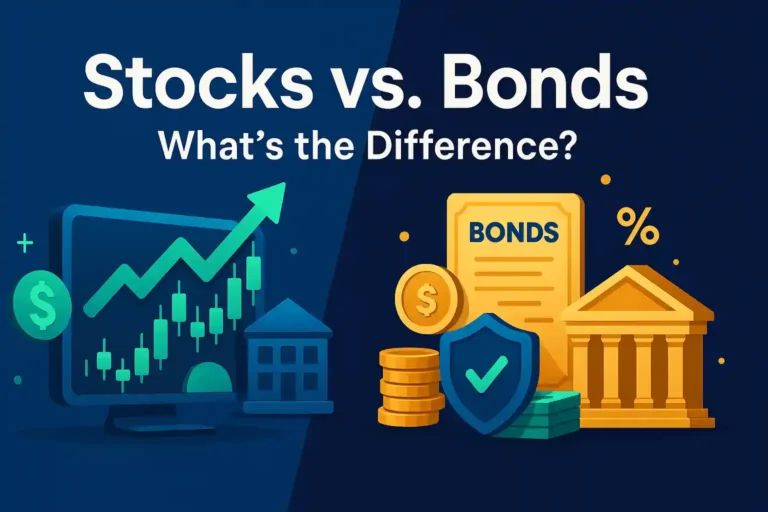When it comes to investing, stocks and bonds are two of the most common options. But they work very differently. Here’s an easy-to-understand explanation of each and how they compare.
What are Stocks?
- Ownership in a Company: When you buy stocks, you’re buying a small piece of ownership in a company. This means you own a part of that company.
- How Stocks Make Money: There are two ways stocks can make money for you:
- Dividends: Some companies pay part of their profits to shareholders as dividends. This is money you receive regularly just for owning the stock.
- Price Increases: The price of the stock can go up over time. If you sell the stock at a higher price than what you paid, you make a profit.
- Risk: Stocks can go up and down in value. The price of stocks can change quickly because of how the company is doing or due to changes in the economy. Stocks are riskier because the company might not do well, and the stock could lose value.
What are Bonds?
- Loan to a Company or Government: When you buy bonds, you’re lending money to a company or government. In return, they agree to pay you back the amount you lent (the principal) plus interest.
- How Bonds Make Money: Bonds pay interest to the bondholder. This interest is usually paid regularly (e.g., every six months or annually) until the bond matures. When the bond matures, you get your original investment back.
- Risk: Bonds are usually less risky than stocks because you know exactly how much interest you’ll earn and when you’ll get your money back. However, if the company or government that issued the bond runs into financial trouble, they might not be able to pay you back, which is a risk.
Key Differences Between Stocks and Bonds
| Stocks | Bonds |
|---|---|
| Ownership: You own a part of the company. | Lending: You are lending money to a company or government. |
| Profit: Earn money through price increases or dividends. | Profit: Earn money through interest payments. |
| Risk: Higher risk. Stock prices can go up and down a lot. | Risk: Lower risk. Bonds usually provide more stable returns. |
| Return: Potential for high returns but also big losses. | Return: Generally more stable, but with lower potential returns. |
| Voting: As a stockholder, you may have voting rights in company decisions. | Voting: No voting rights as a bondholder. |
Which is Better? Stocks or Bonds
- Stocks are great if you’re looking for higher returns and are okay with taking on more risk.
- Bonds are better if you prefer more stable returns and lower risk. They can be a good choice for people who want a steady income stream and less chance of losing money.
Many investors use a mix of both stocks and bonds in their portfolio to balance risk and reward. By doing this, they can enjoy the potential growth from stocks while also having the safety of bonds.
In the end, it all comes down to your investment goals, your tolerance for risk, and how long you plan to invest for.

